|
Progressive Men of
Iowa
1899
BRUNSON, Asahel A., of
the firm of Hoxie & Brunson, real estate and
collection agents, of Algona, is a native of
Vermont, having been born at North Hero, Grand
Isle county, May 29, 1839. His father, Lewis
Brunson, was of Scotch descent and his mother,
Ruth Hazen, came of Irish ancestry, so that, in
the subject of our sketch, the sturdy
characteristics of the Scotch-Irish combination
are well exemplified.
Brought up on a farm,
there were implanted the habits of industry, which
have served him well throughout a busy and
successful life. At the breaking out of the civil
war, he was just in the prime of a vigorous, young
manhood, and promptly answered his country's call
by enlisting in Company H, One Hundred and Sixth
New York infantry, at Lawrenceville, St Lawrence
county, N. Y., in August, 1862. It is
difficult for those of a later generation to
realize that the great armies that fought the
terrible battles of that epoch making war were
composed of just such young men-boys from 18 to
25; from the farms, from the workshops, from the
schools and colleges they came; young, strong,
courageous, bringing the most precious possession
on earth, life itself, to lay upon the altar of
their country.
This young man, just
turned 23 years of age, faced death upon eleven
hard-fought fields; those of Martinsburg, North
Anna River, South Anna River, Manassas Gap, Mine
Run, Wilderness, Spottsylvania Court House, Cold
Harbor, Petersburgh, Manopia Junction, and
Winchester, besides participating in many
skirmishes. He served in the ranks, and as orderly
sergeant until July 1, 1864, at Cold Harbor, when
he was appointed first lieutenant, and took
command of Company I, One Hundred and Sixth New
York. His military career ended in February, 1865,
when he was discharged on account of wounds
received in action, September 19,1864, at the
battle of Winchester.
He at once came to
Iowa, settling first in Clayton county. The
following year, January 13, 1866, he was united in
marriage to Miss Eudora Benjamin, and to them two
children have been born, Willis J. and Glenford A.
Brunson. Both are living and both are
married.
In 1870 they removed to Kossuth county,
where they have since made their home. The first
two years he lived, as did many of the pioneers of
our beautiful prairie state, in a sod house,
teaching school winters and improving his
homestead summers. In 1874 he was elected
superintendent of the county schools, which office
he held for four years. At the
expiration of his second term as superintendent,
he was appointed mail agent on the Chicago,
Milwaukee & St. Paul
railroad, in which place he remained until 1882,
when he formed a partnership with T. L. Crose, to
engage in the grocery business. In 1888 Mr.
Brunson was elected clerk of the district court,
serving two terms.
In 1892 he entered upon
the real estate business, in which he is still
engaged.
Mr. Brunson is
a republican in politics, a Mason, a member of the
James C. Taylor Post, G. A. R., and of the Modern
Woodmen camp of
Algona.
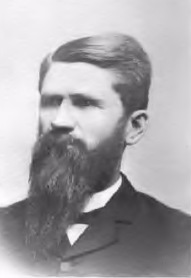 CLARKE, Hon. A. D., was born
at Darlington, Canada, September 26, 1842. His father was
Jasper Clarke, a farmer of moderate means. His
mother's maiden name was Laura Sumner, a daughter
of Shuball Sumner, of the town of Jay, Essex
county, N. Y. Grandfather Sumner was a volunteer
in the revolutionary army and captain of what was
called the Silver Grays, of the town of Jay, Essex
county, N. Y., in the war of 1812. He was an uncle
of the late Charles Sumner, senator from
Massachusetts. CLARKE, Hon. A. D., was born
at Darlington, Canada, September 26, 1842. His father was
Jasper Clarke, a farmer of moderate means. His
mother's maiden name was Laura Sumner, a daughter
of Shuball Sumner, of the town of Jay, Essex
county, N. Y. Grandfather Sumner was a volunteer
in the revolutionary army and captain of what was
called the Silver Grays, of the town of Jay, Essex
county, N. Y., in the war of 1812. He was an uncle
of the late Charles Sumner, senator from
Massachusetts.
Mr. Clarke spent the
most of his childhood and early manhood on a farm
in Fond du Lac county, Wis. Here he had the
advantage of a district school education. He
earned his first dollars husking corn at 25 cents
per day on the farm of Homer Watters, of Byron,
Wis.
When the civil war
broke out patriotic young Clarke enlisted in the
first call for three months' men. Later he
enlisted in the Third Wisconsin Volunteers,
Company F, but failed to pass muster, being under
the required age at that
time.
In 1865 Mr. Clarke
moved to Algona, northwestern Iowa. Here he is a
successful business man, has borne an influential
part for the past thirty-two years in the
development and building up of both town and
country. He began by renting a farm, which he
operated three years. Studied law with Marcus
Robins, an attorney at Algona, and in four years
was admitted to the bar.
Circumstances caused him to drift into the
real estate business. This business growing
rapidly, he gave little attention to the
law.
Mr. Clarke has always
been a republican. In 1887 he was elected a member
of the Iowa legislature, and served one term. In 1893
Governor Boies appointed Mr. Clarke as
delegate to the Trans-Mississippi congress, he
being one of the two republicans from the state.
Governor Drake also, in 1897, appointed him as
delegate to the International Gold Mining
convention held at Denver, July 7, 1897. In 1891
Mr. Clarke helped to organize the Algona State
bank, and was elected its president, a position he
now holds. In 1893 he was one of the organizers of
the Iowa Bankers' State bank at Des Moines. As a
result of this very active, busy life Mr. Clarke
is one of the wealthy men of northwestern
Iowa.
In 1864 he married Mary
J. Phelps, of Byron, Wis., a woman with that
strength of character and vigor of purpose to
accomplish whatever duty seemed necessary, either
in business or social life. This, with a quiet
womanly dignity and love and devotion to her
family, has ever been a powerful factor in her
husband's success. As a
result of this union five children were born. Mary
Edith, Irma D. and Fred S. are now
living.
Mr. Clarke is still farming,
owning about 5,000 acres of land, with about 2,000
acres in cultivation. Hope, cheerfulness and
charity are among this man's chief
characteristics.
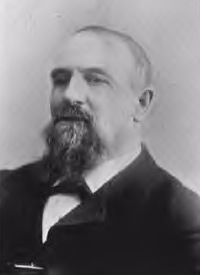 DINGLEY, Frank, Sr., of
Algona, was born in Chautauqua county, N. Y., in
the year 1829. He is the son of Warren Dingley, a
sailor during bis early and middle life. He first
went to sea from Boston harbor, at the age of 12
years, as a cabin boy of the ship "Three
Brothers," of which his father was part owner and
commander.
Before he became of age, he made a voyage
around the world. He later became sailing master
of the "Walk-in-the-Water," the first steamboat
that plowed the lakes. General Lafayette, during
his last visit to the United States, took passage
with him from Buffalo, and through the upper
lakes.
While thus
employed he purchased a tract of land from the
Holland Land company in Chautauqua county, N. Y.
and there reared his family of eight children. The
maiden name of the present Mr. Dingley's mother
was Anne Patterson. She was of Scotch descent, and
removed with her parents to western New York when
but 12 years of age. She acquired an education,
which at that early time fitted her for the a
vocation of teacher, and for several years prior
to her marriage, in 1821, taught in the village
and district schools in Chautauqua county. The
ancestors on the paternal side were English, and
the coat of arms is still in the possession of Mr.
Dingley. Ex-Gov. Nelson Dingley, of Maine, now a
member of congress, and famous as the author of
the Dingley tariff bill, and the late Dr. Amasa
Dingley, of New York, are among the more notable
members of this family. On the maternal side may
be mentioned ex-Governor Patterson, of New York.
In a work prepared by him that branch is traced
back to the time of the settlement of the colony
at Massachusetts bay, and indirectly to the
settlement at Flatbush, Ireland, by the Scotch,
centuries ago. DINGLEY, Frank, Sr., of
Algona, was born in Chautauqua county, N. Y., in
the year 1829. He is the son of Warren Dingley, a
sailor during bis early and middle life. He first
went to sea from Boston harbor, at the age of 12
years, as a cabin boy of the ship "Three
Brothers," of which his father was part owner and
commander.
Before he became of age, he made a voyage
around the world. He later became sailing master
of the "Walk-in-the-Water," the first steamboat
that plowed the lakes. General Lafayette, during
his last visit to the United States, took passage
with him from Buffalo, and through the upper
lakes.
While thus
employed he purchased a tract of land from the
Holland Land company in Chautauqua county, N. Y.
and there reared his family of eight children. The
maiden name of the present Mr. Dingley's mother
was Anne Patterson. She was of Scotch descent, and
removed with her parents to western New York when
but 12 years of age. She acquired an education,
which at that early time fitted her for the a
vocation of teacher, and for several years prior
to her marriage, in 1821, taught in the village
and district schools in Chautauqua county. The
ancestors on the paternal side were English, and
the coat of arms is still in the possession of Mr.
Dingley. Ex-Gov. Nelson Dingley, of Maine, now a
member of congress, and famous as the author of
the Dingley tariff bill, and the late Dr. Amasa
Dingley, of New York, are among the more notable
members of this family. On the maternal side may
be mentioned ex-Governor Patterson, of New York.
In a work prepared by him that branch is traced
back to the time of the settlement of the colony
at Massachusetts bay, and indirectly to the
settlement at Flatbush, Ireland, by the Scotch,
centuries ago.
Frank Dingley, Sr., was
the youngest of three brothers in a family of
eight children, and remained on the farm with his
parents until 21 years of age. Among the
companions of his early school days, in the little
red school house of Chautauqua county, were
General Schofield, late commander of the United
States army, his brother, Rev. James
Schofield, Col. George Camp and Hon. H. C Waite,
all of whom became noted in after life. He came to
Dubuque, Iowa, in 1854, then to Jamestown, a
mining camp in Grant county, Wis., where he
engaged in lead mining. In this he was not
successful, and the following spring went to work
on his uncle's farm, having leased it in company
with his cousin, George Patterson, and, having a
good contract, together with a bountiful crop and
good prices, their agricultural operations were
very profitable.
In the spring of 1857 he went on the road
for the Eagle Reaper company, and in that, too, he
was highly successful, so that at the end of one
year he was able to open a general store at
Georgetown, Wis. Here he remained for a year, when
the hard times which still linger in the minds of
the older citizens came on, and the business was
disposed of.
Going thence to Alabama he soon became
convinced that the south was no place for a
northern man, and his stay there was of short
duration. He was married at Old Windham, Conn., in
August, 1859, to Miss Harriet C. Williams, a
native of Willimantic. They have
had three children, two of whom are now living.
Shortly after the marriage they returned to
Wisconsin, where they remained for five years,
then removed to his early home in New York. In the
spring of 1879 he again came west, locating this
time at Masonville, Delaware county, Iowa, where
he engaged in the general merchandise business. On
the death of his eldest son he disposed of his
interest there and returned to Wisconsin, but
after two years became dissatisfied and removed to
Algona, his present residence, and has since
formed a partnership with his son-in-law, J. L.
Donohoe, in the real estate, loan and insurance
business. After extended travel all over the
United States he is firmly grounded in the belief
that of all that is good Iowa furnishes the best.
His son, Frank W., is a successful druggist in
Algona.
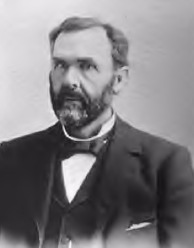 FARLEY, James M. The virtues
of the Irish people, that race so many members of
which were driven from their native soil by the
oppressions which sent at one time 450,000 of the
flower of its youth to fight in the armies of
every country in Europe, are marked in the
descendants who have contributed so much to the
defense and development of this land of
liberty. FARLEY, James M. The virtues
of the Irish people, that race so many members of
which were driven from their native soil by the
oppressions which sent at one time 450,000 of the
flower of its youth to fight in the armies of
every country in Europe, are marked in the
descendants who have contributed so much to the
defense and development of this land of
liberty.
James M. Farley, of Whittemore, is
of the vigorous and liberty-loving Irish stock
which volunteered its services to preserve the
republic that was given birth in the bloody ground
of Sedan. There were Farleys among those who faced
the mobs in the streets of Paris and stood
resolutely and fearlessly for the dignity and
perpetuation of the infant government, and again
in our own country they have left their stamp on
the enduring pages of military glory. Michael
Farley and Mary Dolan Farley, the parents of this
subject, were born and reared on the little green
isle, but came to the United States and Wisconsin
in an early day.
It was there James M. Farley was
born May 19, 1844, in Lyons township, Walworth
county. His early education was received in the
common schools of his native state. He worked on
the farm until 1878, when he removed to Iowa and
located in the now prosperous little city of
Whittemore. At that time the place contained but
one dwelling house, two warehouses and the
railroad depot. The depot
was a two-story building, the upper part being
occupied by the family of the agent, with whom Mr.
Farley boarded. For a
place to sleep he was obliged to make the best of
the accommodations offered by the waiting room.
With $1,000, which he had saved from his labors on
the farm, he erected a store building and embarked
in the hardware business. Although it was his
first business venture it proved a quite
successful one, and there were added, in time,
coal, lumber and livestock. The country has made
wonderful progress during the time that Mr. Farley
has lived there, and he has kept step with the
advancement. The town now has more than 600
people, solid brick business blocks, churches, a
model and modern schoolhouse and scores of
handsome residences. During the time his section
has been undergoing the transformation from a
bleak prairie settlement to a well improved and
prosperous town, Mr. Farley has, through good
management, tireless endeavor and honorable
dealings with his patrons, earned for himself a
comfortable competence.
In politics he is a republican, as
was his father before him. In 1872, however, he
supported Horace Greeley, and in the late campaign
was on the side of William Jennings Bryan. He
represented his district in the Twenty-seventh
General Assembly. He is a thirty-second degree
Mason, a member of the Knights of Pythias and
order of the Modern Woodmen.
He is not connected with any religious
denomination. He was married in October, 1873, to
Miss Tressa J. Dutcher. They have
three children, two girls and one boy. Prances E.,
the oldest, was born in Wisconsin; Mary A. and Guy
E. were born in the Hawkeye
state.
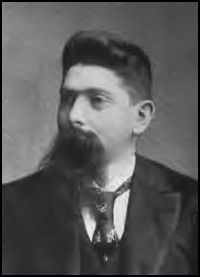 FELLOWS, Homer Harrison, of
Wesley, a member of the law firm of Bonar &
Fellows, of Wesley and Algona, is one of the
self-made men who have had so large an influence
in the making of Iowa a proud and substantial
common-wealth. He was born April 27, 1864, in a
log cabin on the bank of the Des Moines river, in
Van Buren county. His father, W. M. V. B. Fellows,
was one of the leading and influential farmers of
the county.
His mother's maiden name was Matilda
A.
Peterson. His father's family comprised
eleven children, eight sons and three daughters,
all living, honorable, industrious and successful
in their various vocations. Mr. Fellows'
ancestry in America dates back to the days of the
Pilgrim fathers, the first, William Fellows,
coming from England soon after the landing of the
Mayflower. In the line of ancestry have been many
men of eminence, intellectual, highly moral and
patriotic citizens. FELLOWS, Homer Harrison, of
Wesley, a member of the law firm of Bonar &
Fellows, of Wesley and Algona, is one of the
self-made men who have had so large an influence
in the making of Iowa a proud and substantial
common-wealth. He was born April 27, 1864, in a
log cabin on the bank of the Des Moines river, in
Van Buren county. His father, W. M. V. B. Fellows,
was one of the leading and influential farmers of
the county.
His mother's maiden name was Matilda
A.
Peterson. His father's family comprised
eleven children, eight sons and three daughters,
all living, honorable, industrious and successful
in their various vocations. Mr. Fellows'
ancestry in America dates back to the days of the
Pilgrim fathers, the first, William Fellows,
coming from England soon after the landing of the
Mayflower. In the line of ancestry have been many
men of eminence, intellectual, highly moral and
patriotic citizens.
Mr. Fellows' early
school days were spent in the district schools of
Van Buren county. He attended the Keosauqua high
school and longed for a college education. But his
father denied financial aid, preferring to have
his boys remain on the farm, for which work he
considered a higher education unnecessary. When he
was 19 years of age, the ambitious boy took the
ordering of his life into his own hands and left
home with the determination to have a college
education. He began teaching in Mt Zion, as
principal of the school, at $40 per month, and in
1884 was able to enter the preparatory department
of Iowa Wesleyan university at Mt. Pleasant. By
his own efforts entirely, earning money by
teaching and by working on a farm in summer, he
graduated in 1890 with the degree of A. B., and
taking first rank in his class. The next year he
became superintendent of Sac City schools, where
be remained two years. He then entered the law
department of the State university, from which he
graduated in 1894 with the degree of LL. B.,
receiving from his alma mater the same year the
degree of A. M. In the
fall of 1894 the partnership of Bonar &
Fellows was formed. Jesse L. Bonar was born in
1865 at Moundsville, Va., and was reared on a farm
near Creston. He is a graduate of the collegiate
department of the State university with the degree
of A. B., and was a classmate of Mr. Fellows in
his law course. Their first location was at Algona
in January, 1895. Soon after they established an
office in Wesley, which is managed by Mr. Fellows,
while Mr.
Bonar has charge of the Algona office. They have
been highly successful in business, their practice
constantly growing and their reputation as a firm
well and favorably established. In school both
were members of McClain's Chapter of Phi Delta
Phi, legal fraternity, and took high rank in their
class. Mr. Fellows is a republican and was a
candidate for the office of county attorney in
1897, and Mr. Bonar is a
democrat, chairman of the democratic county
committee of Kossuth county, which party he led to
victory that fall. Mr. Fellows is a member of the
Methodist church.
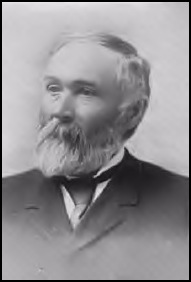 INGHAM, Capt. William H., of
Algona, one of the best known pioneer settlers of
northwestern Iowa, is a native of the old empire
state, came to Iowa nearly fifty years ago, and
has been an active force in the development of the
state.
His father, Harvey Ingham, was born in
Herkimer county, N. Y., in 1795, and was a
schoolmate and life-long friend of the eminent
anti-slavery leader, Gerrit Smith. He learned the
clothier's trade when a boy, and after attaining
manhood he erected a woolen mill near the present
town of Dodgeville. He acquired other mills and
built up an extensive business on East Canada
creek, which furnished the water power, and the
place was known as Ingham's Mills. He was an
active member of the Baptist church, and an ardent
abolitionist and temperance worker. He lived to
the advanced age of 87 years, having spent his
long and useful life in the home he had
established in his early manhood at Ingham's
Mills. His wife was Sarah Schuyler, who was born
in Montgomery county, N. Y., in 1799. She was a
woman of most estimable character, a devoted wife
and mother, noted for her benevolence and
life-long helpfulness and sympathy for the poor
and unfortunate. She died in her 82d year, a
member of the Baptist church. The Inghams were
large and muscular, and along-lived family; five
brothers of Harvey's father attained ages ranging
from 90 to 99. INGHAM, Capt. William H., of
Algona, one of the best known pioneer settlers of
northwestern Iowa, is a native of the old empire
state, came to Iowa nearly fifty years ago, and
has been an active force in the development of the
state.
His father, Harvey Ingham, was born in
Herkimer county, N. Y., in 1795, and was a
schoolmate and life-long friend of the eminent
anti-slavery leader, Gerrit Smith. He learned the
clothier's trade when a boy, and after attaining
manhood he erected a woolen mill near the present
town of Dodgeville. He acquired other mills and
built up an extensive business on East Canada
creek, which furnished the water power, and the
place was known as Ingham's Mills. He was an
active member of the Baptist church, and an ardent
abolitionist and temperance worker. He lived to
the advanced age of 87 years, having spent his
long and useful life in the home he had
established in his early manhood at Ingham's
Mills. His wife was Sarah Schuyler, who was born
in Montgomery county, N. Y., in 1799. She was a
woman of most estimable character, a devoted wife
and mother, noted for her benevolence and
life-long helpfulness and sympathy for the poor
and unfortunate. She died in her 82d year, a
member of the Baptist church. The Inghams were
large and muscular, and along-lived family; five
brothers of Harvey's father attained ages ranging
from 90 to 99.
William H. Ingham was
born at Ingham's Mills, N. Y., November 27, 1827.
The district school fur-nished him instruction and
discipline until he was 10 years old, when he was
sent to a private school taught by Elder Beach, a
Baptist minister and graduate of Yale university,
one of the ablest men of his denomination in that
day. Here the youth were immediately drilled in
Greek, to gratify the teacher's ambition to have
them read his favorite book, the Greek testament.
After a course in Little Falls academy, William
H., at the age of 17 years, went into business,
working in his father's sawmill, flouring mill and
woolen mill until he had acquired a good degree of
skill in each. In 1846 he entered into partnership
with his brother, Warren R., for the manufacture
of lime, lumber and wooden ware, and they
afterward purchased an oil mill. In 1819 William
H., sold his interest and the following spring
came to Washington county, Iowa, on a visit to his
father's uncle, John Ingham, one of the early
settlers of southeastern Iowa. On this trip he
passed through Cedar Rapids, and was so much
pleased with the enterprising new town that in
1851 he went there to live. Beginning with an
engagement to survey and locate lands for the
banking house of Greene Weare, he was soon engaged
in a general land business of his own. In
November, 1854, he took a trip into Kossuth
county, and foreseeing the coming development and
prosperity of that beautiful, wild, but fertile
country, he decided to make it his home. In
Jan-uary, 1855, he settled on a claim and soon
after removed to a new home on section 24,
township 96, range 29 in Kossuth County, not far
from Algona.
In 1865 he moved into the new town of
Algona where he engaged in a general land business
and surveying. As the town grew and the demand was
felt, he added the selling of exchange and opened
the first eastern account from the county, with
the since famous New York banker, Austin Corbin,
in January, 1867, and drew the first draft for
$100, in favor of James L. Paine. In January,
1870, Captain Ingham associated himself with Lewis
H.
Smith in a general banking business, under
the firm name of Ingham &. Smith, and in May,
1873, organized the Kossuth County bank, which
they still maintain in a prosperous condition,
under the name of the Kossuth County State bank,
being the first one in the
county.
Soon after the massacre
of the settlers around Okoboji and Spirit lakes,
in the spring of 1857, by the Sioux Indians, under
the leadership of Inkpadutah, Mr. Ingham joined a
company which was organized by the settlers in his
vicinity and marched to Tuttle's lake to protect
the settlers on the frontier and quiet their fears
of Indian raids. They found
and drove off some Sioux Indians who had sheltered
Umpashotah, and allayed the alarm of the people in
that section. In 1862, after the terrible massacre
of the settlers in southern Minnesota and the
destruction of New Ulm, by the Sioux Indians, Mr.
Ingham and W. B. Carey went to the ruins of the
town in order to learn the extent of the outbreak.
Upon his return a military company was organized
by authority of Governor Kirkwood, for frontier
protection, and Mr. Ingham was commissioned
captain. Ed. McKnight, of Humboldt county, was
first lieutenant, and Jesse Coverdale was second
lieutenant. Other companies were raised, and all
were united In the North-ern Border brigade, under
command of Colonel Sawyer. After protecting the
frontier until the summer of 1863, it was relieved
from duty by a company under command of Captain
Ingham.
This volunteer organization of courageous
pioneers guarded the settlements until December
29, 1863, when it was relieved by a troop of
cavalry from General Sully's army and mustered out
by Lieut.
L. H. Smith, quartermaster of the Border
brigade.
Captain Ingham has always been a
republican, but has never held an office to which
a salary was attached, except that he was
postmaster of Kossuth Center for a few years, in
an early day. He does not belong to any church,
though he has contributed to several; he is a
member of the Masonic
order.
On the 25th of
November, 1857, he was married to Miss Caroline A.
Rice, daughter of Thomas A. Rice, of Fairfield, N.
Y.
They have had eight children, six of whom
are living. They are: Harvey, born in 1858,
married to Miss Nellie Hepburn, in 1894, and lives
in Algona, where he is editor of the Upper Des
Moines, one of the best known weekly papers in
Iowa, and postmaster; Anna C., born in 1860, died
in 1895; Mary H., born in 1862, married in 1887,
to Clarence M. Doxsee, and lives in Algona; Helen
V., born in 1864, married to Charles W. Russell,
in 1890, and lives in Omaha, Neb.; Charles S.,
born in 1866, and died in 1867; George W., born in
1868, and is now a practicing physician in
Olympia, Wash., was married April 17, 1895, to
Miss Emma Reed; Cornelia, born in 1870, was
married November 25, 1897, to William J.
McChesney, and lives in Iowa City; and Thomas
Frederick, born in 1872, a graduate of the law
department of the State University of Iowa, and
now a practicing attorney at Spencer,
Iowa.
Captain Ingham is now
living in the quiet enjoyment of the results of a
busy and fruitful life, with his children well
settled, good health as his portion and his
affairs so arranged that he can and does enjoy
life. He is one of the most devoted disciples of
Izaak Walton, and one of the most skillful. He
knows the inhabitants of American waters, both
salt and fresh, and how to lure them from their
hiding places. He has caught everything from
tarpon to trout.
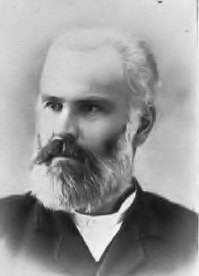 SMITH, Lewis H., of Algona,
Iowa, was born at West Cambridge, now Belmont,
Mass., March 21, 1835. His father, Edward Smith,
was a mason and contractor, and afterwards a
farmer at the same place, where he married Abigail
Wyman Richardson, daughter of Richard Richardson,
of Ashby, Mass., the man who constructed the old
turnpike road from Cambridge to Concord, Mass. SMITH, Lewis H., of Algona,
Iowa, was born at West Cambridge, now Belmont,
Mass., March 21, 1835. His father, Edward Smith,
was a mason and contractor, and afterwards a
farmer at the same place, where he married Abigail
Wyman Richardson, daughter of Richard Richardson,
of Ashby, Mass., the man who constructed the old
turnpike road from Cambridge to Concord, Mass.
Young Smith was
educated in the common school in West Cambridge,
in the usual branches, including mathematics and
surveying, and the Latin and French languages. He
did not enter college, but became a clerk in a
wholesale cigar store, for his uncle, one year,
1851. He came west in May, 1853, and was employed
as a rodman in the engineering corps on the
Chicago & Rock Island railroad, at Triskelia,
and Sheffield, 111. He went to
Iowa in December, 1853, on the old Mississippi
& Missouri, now the Chicago, Rock Island A
Pacific railroad, working as a rodman, and
afterward as leveler and transit man on the same
road, between Davenport and Grinnell, and on a
branch line from Muscatine to Cedar Rapids. He
worked on all these lines until the fall of 1854.
He taught school at Snook's Grove, between what
are now Victor and Brooklyn, during the winter of
1855, in the Manatt settlement. He then went to
Kossuth county via Des Moines and Ft. Dodge, being
engaged in the United States surveys under Gov. C.
C. Carpenter. He entered the county July 4, 1855;
one month later he was elected the first county
surveyor, and in the summer of 1858 surveyed and
platted the town site of
Algona.
In April, 1857, he
volunteered to go with A. L. Seelev,
Jacob Cummins, Peter Relbhoff, William Campbell,
Mr. Tuttle and his son Columbus, under the
leadership of Capt. W. H. Ingham, from Algona to
the head of the east fork of the Des Moines river,
to learn whether Mr. Tuttle's family were killed
by the Indians. They found and drove out of the
country, two bands of Indians. In May, 1857, he
was elected captain of the first military company
raised in the county, but he never saw service in
that capacity. He put up the first notary's sign,
the first store sign, and in connection with
Captain Ingham, the first bank sign in the county.
He brought to the county the first sewing machine
and the first piano, put up the first frame
building in Algona, and burned the first kerosene
oil in the county, and received for services the
first county warrant issued in the county. He also
received the first warrant issued in Emmet County,
for locating the county seat of Emmet County at
Estherville, under a commission from the
governor.
In August, 1867, he was elected judge of
Kossuth County, only three votes being cast
against him, and was at that time probably the
youngest county judge in the stile. In 1866 he was
appointed county judge to succeed Luther Rist, who
resigned, and at the general election, 1867, was
elected county judge, and served till the office
was abolished. He served
as enrolling and reading clerk under Hon. Chas.
Aldrich, at the legislative session of 1860 (when
the code was revised) and at the extra session of
1861 (the first war session). He was deputy county
treasurer under L. L. Treat in 1860 and 1861, and
read law and was admitted to the bar, being the
first admission in the county, by Judge A. H.
Hubbard, in 1860. In 1850 he was a commissioner
with Judge Pease, of Webster, and Judge Hutchison,
of Humboldt counties, to settle all accounts
between Humboldt and Webster counties. In 1862 he
was appointed quartermaster of the Northern Border
brigade, a force of five companies of cavalry
raised by the state, and commanded by Lieut.-Col
J. A. Sawyer, for defense of the border against
the Indians, after the Indian massacre in 1862, in
Minnesota, continuing in the service till January,
1864. In 1864, with J. E. Blackford and E. N.
Weaver, he operated a sawmill in connection with
other business. In 1865 he was again elected
surveyor of Kossuth county, but did not qualify,
owing to other business. In 1865 and winter of
1866 was engaged as engineer of the Sawyers' wagon
road, from the mouth of the Niobrara river to
Virginia City, Mont. This road, 1,000 miles in
length, was for nearly the whole distance through
an unexplored country, teeming with hostile
Indians, and but for the bravery and indomitable
energy of Colonel Sawyers, the party would never
have gotten through.
Like many other
government wagon roads, the pushing out of the
Northern Pacific railroad, in 1866 and 1867,
rendered it useless. In July, 1866, he was
appointed postmaster at Algona, but resigned in
1867, on account of other business. In the spring
of 1866, in company with his brother, John G.
Smith (since a member of the legislature of Iowa,
and now a member of the board of supervisors of
this county), he commenced selling merchandise at
Algona. In 1868, Francis C. Rist, a brother-in-law
and a pioneer of 1856, entered the firm. In
January, 1870, Mr. Smith sold out his interest,
and entered the banking business in company with
Capt. Wm. H. Ingham, as president, and Lewis H.
Smith, as cashier, which has been continued to
this time with the largest line of depositors and
business of any bank in the county. He has always
been a republican in politics, was a member of the
state republican central committee in 1858-69-60,
and was secretary of state conventions in those
years. He was made a Mason in 1867, in Prudence
Lodge No. 205, and was master of the lodge three
years: also a companion in Prudence Chapter No 9.
He is also a Knight Templar in Esdraelon
Commanderv No. 62, of Esthervllle, Iowa. He does
not belong to any church, but attends the
Congregational church, where his wife is a regular
member. He was trustee of Algona college from its
inception in 1870 to its dissolution. Commenc-ing
in 1878, he was a member of the board of trustees
of the Insane Hospital at Independence, serving
twelve years, being president of the board eight
years.
He was married in
August, 1857, to Abbie M. Rist, daughter of Hon.
Luther Rist, formerly of Whitenville, Mass., and a
pioneer of Kossuth county of 1866. She died in
1866, leaving four children, Mary A., Nellie E.,
Fannie S., and Edward L., the last named being now
dead. He was married the second time in 1872, to
Eugenia Rist, widow of Francis C. Rist, who was a
son of Luther Rist, above named, and a pioneer of
1855. She had at that time three children, Charles
W., Hiram E.
and Dick, who are still living. The
children by the last marriage are Mabel F., Ruby
E., and Hortense M., all of whom are now
living.
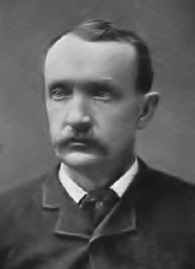 SPENCER, Robert H., of
Algona, ex-member of the general assembly of Iowa
and at present treasurer of his county, was born
at Thornville, Perry county, Ohio, September 20,
1840. SPENCER, Robert H., of
Algona, ex-member of the general assembly of Iowa
and at present treasurer of his county, was born
at Thornville, Perry county, Ohio, September 20,
1840.
His father, Eli A.
Spencer, was born near Somerset, Ohio, May 27,
1817. The early life of the father was spent on a
farm and later he was engaged in the mercantile
business. When he had received a good common
school education he entered upon the study of law
and after his admission to the bar soon became one
of the leading members of the legal profession in
his section of the-state. The principal portion of
his time, from 1852 to 1858, was devoted to the
building of the Sciota & Hocking Valley
railroad, in which venture all his private means
were invested. The line
of road extended from Portsmouth on the Ohio
river, north, to connect at Newark with the road
running to Sandusky on Lake Erie. He was president
of the road for a period of two years. The
financial crash of 1857 caused suspension of work
on the construction of the road, and it was never
wholly completed. The portion that had been built
was finally merged into the Baltimore & Ohio
system.
In politics he was an
ardent whig until the division of that party, when
he was among the first to join the republican
party at its organization. He was a delegate to
the first republican state convention in Ohio,
which was held in Columbus in July, 1855, and
nominated Salmon P. Chase for governor. In the
fall of the same year he was elected, on the
republican ticket, state senator from the district
comprising the counties of Muskingum and Perry,
both hitherto strongly democratic, and served
until January, 1858. In the spring of 1858 he
removed to Wisconsin, locating at Madison, where
he resumed the practice of law, but devoted a
portion of his time to the cultivation of a farm,
previously purchased near the city, he being
especially fond of agricultural pursuits. He soon
became prominent in the state, and on January 1,
1864, was appointed assistant secretary of state,
in which position he served until 1870. In the
meantime he compiled and published a digest of the
laws of the state. At the conclusion of his term
of service he retired to his farm, though
continuing the practice of his profession to some
extent. In 1883 he sold his farm and removed to
Rice Lake in the northern part of the state, and
there died of apoplexy June 2, 1887, in the 71st
year of his age. His father
was married, in 1839, to Ann M. Chilcote, who was
born at Huntingdon, Pa., in 1818. She is the
eldest of a family of ten children, seven of whom
are now living. She is
still hale and hearty, although 78 years
old.
The family of which
Robert H. Spencer is a member consists of four
sons, all of whom are living, the youngest being
now in his 52d year. Three served in the late war.
One has held positions in the treasury department
and United States senate, at one time the chief
clerk of that body.
The early youth of
Robert was spent on his father's farms in Ohio and
Wisconsin until 1861 when he enlisted as a private
in the Tenth Wisconsin infantry. He was promoted
to lieutenant and captain and assigned to the army
of the Ohio, under Buell, and later transferred to
the army of the Cumberland, under Rosecrans and
Thomas.
He was captured toward the close of the
battle of Chickamauga, and imprisoned in the holes
of rebel torture at Richmond, Danville, Macon and
Charleston. He escaped in October, 1864, and
re-enlisted as lieutenant-colonel of the
Forty-seventh Wisconsin infantry, in which he
served until the end of the war, and was mustered
out as brevet-colonel of volunteers. He was made
the first commander of the Fourth district
Wisconsin G. A. R., at its organization. The war
over, he returned to Wisconsin and engaged in the
mercantile business at Sheboygan Falls. He removed
to Algona, Iowa, October, 1870. In 1872 he was
appointed postmaster, and held the office until
1885. He was a member of the general assembly
during 1885-1886. In 1893 he was further honored
by election to the office of treasurer of his
county, and at the close of his first term was
re-elected. He is a member of the Masonic, Knights
of Pythias, Woodmen, and G. A. R., orders. He was
married in 1866 to Josephine L. Rowley, of
Sun Prairie, Wis. They have one daughter. A son
died in infancy.
The information on Trails
to the Past © Copyright may be used in personal family history research, with source citation. The pages in entirety may not be duplicated for publication in any fashion without the permission of the owner. Commercial use of any material on this site is not permitted. Please respect the wishes of those who have contributed their time and efforts to make this free site possible.~Thank you! |